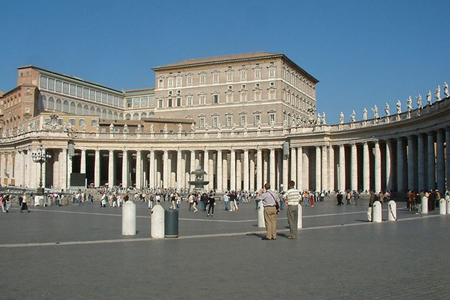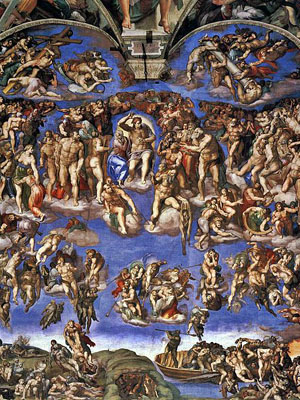| |
 |
 |
 |
| Comment on this report, or find other reports. |
 |
| Our Mystery Worshippers are volunteers who warm church pews for us around the world. If you'd like to become a Mystery Worshipper, start here. |
 |
| Find out how to reproduce this report in your church magazine or website. |
|
|
| 2502: Conclave
of Cardinals, Vatican City |
 |
 Photo:
© Radomil and used under license
Photo:
© Radomil and used under license
|
 |
Mystery
Worshipper: Mosca sul Muro.
The church:
Conclave of Cardinals, Vatican City.
Denomination:
Roman Catholic.
The building:
The conclave was held in the chapel (known as the Sistine Chapel)
of what used to be called the Papal Court. The chapel occupies
one of the buildings that comprise the Palace of Sixtus V (not
to be confused with Quintus VI), which is the official residence
of the Pope. The palace was begun in 1589 to replace earlier
papal apartments that had fallen into disrepair. Aside from
its world-famous frescoes by Michelangelo, Botticelli and others,
the Sistine Chapel is best known for a motet, the Miserere,
which was written for the chapel choir by the late Renaissance
composer Gregorio Allegri and is sung there every year during
Holy Week. For many years it was forbidden to make copies of
the manuscript of the Miserere under pain of excommunication,
and it was not performed outside the Vatican until after 1770,
when a 14-year old boy by the name of Wolfgang Amadeus Mozart
transcribed it note-perfect from memory after hearing it sung.
The church:
The College of Cardinals advises the Pope on church matters
when summoned to do so, giving new meaning to the expression
"When I want your advice, Iíll ask for it." One of
its other functions is to arrange to have the papal throne reupholstered
whenever the condition known as sede vacante occurs.
The neighbourhood: The Vatican, a walled enclave surrounded by the city of Rome, is the smallest sovereign state in the world. It is approximately 110 acres in size and has a population of around 800. Created by treaty in 1929, Vatican City is strictly speaking not a vestige of what were once called the Papal States; it is, however, all that remains of the Pope's worldly dominions.
The cast:
His Eminence Angelo Cardinal Sodano, dean of the College of
Cardinals and titular bishop of Ostia, presided. He was assisted
by three Cardinal Scrutineers who were elected on the spot to
supervise the voting, and by the Revd Msgr Guido Marini, master
of papal liturgical ceremonies.
The date & time:
Tuesday, 12 March 2013, 3.00pm.
What was the name of the service?
Papal Conclave.
How full was the building?
There were 115 robed clerics, constituting the College of Cardinals
(well, most of them, anyway). The one or two of us in attendance
who were not members of that elite body tried as best we could
to make ourselves inconspicuous, for reasons that should be
all too evident.
Did anyone welcome you personally?
No. In fact, we had a distinct feeling that the cardinals would
have preferred that we not be there!
Was your pew comfortable?
I had to sit in a corner at the rear of the chapel on a small
three-legged stool (about which more later) into which the initials
"R.H." had been carved. By tradition, observers always
sit on this stool, so it stands to reason that I would also.
Its use is thought to be sanctioned by scripture, specifically
Psalm 110. It was pretty much as comfortable as one would expect.
The cardinals, on the other hand, sat in specially constructed
stalls that looked rather plush.
How would you describe the pre-service
atmosphere?
Hushed but expectant.
What were the exact opening words of the
service?
They were in Latin: Extra omnes. I confess that Latin
is not one of my strong points, but as one of the Swiss Guards
was taking dinner orders as the master of ceremonies spoke those
words, I assumed the good monsignor was trying to say that he
wanted to super-size his meal. I did note that many of the cardinals,
apparently hoping for a quick balloting, declined to order dinner.
The Swiss Guards left with order book in hand, shutting the
doors behind them.
What books did the congregation use during the
service?
Freshly printed hardbound copies of Ordo Rituum Conclavis
and Liturgia Horarium had been placed in front of each
cardinal's chair. I also spotted well-worn, dog-eared copies
of John Collins' Primer of Ecclesiastical Latin tucked
inconspicuously into the folds of the mozzettas of many of the
cardinals.
What musical instruments were played?
Harmonica, but only for one number (see below). Moreís the pity,
as I thought Their Eminences could have used a little help staying
on pitch as they sang the opening Veni Creator Spiritus.
Did anything distract you?
Michelangeloís fabulous fresco of the Last Judgment was a major
distraction. I kept wondering which (if any) churchmen Michelangelo
would have consigned to the, erm, other place if he were creating
the fresco today. And during a particularly heated moment of
debate, I thought I heard "Shine Jesus Shine" being
played on a digital synthesizer. When I saw one of the cardinals
reach surreptitiously under his robes and pull out a cell phone,
I realized I had been mistaken.

Photo:
PD-Art
Was the worship stiff-upper-lip, happy clappy, or
what?
It was actually rather lively and animated, considering that
the participants consisted almost entirely of elderly celibate
men in lace-trimmed gowns. I had previously written the name
of my favorite candidate on the back of the Mystery Worship
calling card, and I managed to slip the card in the plate during
the balloting that turned out to be the final vote. As the Cardinal
Scrutineer was counting the tally, he suddenly held up the calling
card and, with a surprised but relieved look on his face, announced,
"A Spiritu Sancto decretum est: habemus papam!"
The dean then led us all in a feisty rendition of "Cum
sancti gradientes progrediuntur", which again could
have stood some instrumental support, and which I somehow think
would have sounded better in its original English. Oh, if Louis
Armstrong had only been there!
Exactly how long was the sermon?
45 minutes.
On a scale of 1-10, how good was the preacher?
3 – I thought the new Popeís sermon sounded very much like the ecclesiastical equivalent of an Academy Awards acceptance speech, complete with some really obnoxious Catholic name-dropping and accompanying shout-outs. All that was lacking was the wrap-up music.
In a nutshell, what was the sermon
about?
His Holiness managed to thank everyone who had exerted any influence whatsoever in his upbringing, education, and ministry, from the nanny who had sterilized his baby bottle nipples to the master of ceremonies who held his crosier for him at mass (using the vimpa, of course).
Which part of the service was like being in
heaven?
As the new Pope returned from the robing chamber resplendent
in his white soutane, one of the American cardinals whipped
out a pocket harmonica and struck up a bouncy rendition of "Hail
to the Chief." He was quickly silenced, however, by a glare
from the Cardinal Dean Ė a heavenly gesture for which we were
all grateful. As the cardinals walked up to kiss the Popeís
hand as a sign of respect, I was reminded somehow of the ascendancy
of Michael Corleone at the conclusion of The Godfather,
one of my favorite films. Also, I could be imagining things,
but I thought I saw His Holiness slip what appeared to be a
small rectangle of colored paper with architectural designs
and numbers engraved thereon into the left hand of several of
the cardinals while they kissed his right hand. How heavenly
of him to present his brothers with a souvenir, I thought.
And which part was like being in... er... the other place?
Those of you who object to the sweet smell of incense have had
nothing to object to until youíve smelled the pungent odor of
paper ballots being burned with special chemicals to turn the
smoke black.
What happened when you hung around after the service looking lost?
I remained seated on the three-legged stool, but I was aware
of several curious glances cast in my direction by the cardinals.
Finally one of them came up to me and whispered in my ear, "Cave
Kalendas Aprilis." Again, my Latin is weak, but I
think he was advising me to carve a calendar for April. Exactly
what he meant by that remark, I have no idea.
How would you describe the after-service
coffee?
The new Pope heated up some leftover fugazzeta de verdura
at the furnace where the ballots had been burned and took great
pleasure in serving us all. It was delicious, but unfortunately
this delayed the Holy Father's appearance on the balcony for
over an hour. When he finally stepped out to bless the assembled
throngs, the rest of us adjourned to the chapelís caffeteria,
where hot, strong espresso was served up in proper demitasse
cups onto which the letters "FPM" had been emblazoned.
The Vatican pottery shop sure works fast! Also available were
some delicious cannoli and bomboloni. The
cardinals freely indulged, especially those who had foolishly
foregone ordering dinner. Judging from some of Their Eminencesí
waistlines, the caffeteria must have been one of their
favorite hangouts during the past several weeks.
How would you feel about making this church your regular (where 10 = ecstatic, 0 = terminal)?
N/A – Itís not something that happens every day, Deo
gratias.
Did the service make you feel glad to be a
Christian?
What do you think?
What one thing will you remember about all this in seven days' time?
Cave Kalendas Aprilis. |
|
|
 |
 |
 |
| We rely on voluntary donations to stay online. If you're a regular visitor to Ship of Fools, please consider supporting us. |
 |
 |
 |
| The Mystery Pilgrim |
 |
| One of our most seasoned reporters makes the Camino pilgrimage to Santiago de Compostela in Spain. Read here. |
 |
 |
 |
| London churches |
 |
| Read reports from 70 London churches, visited by a small army of Mystery Worshippers on one single Sunday. Read here. |
| |
|
|
|
|


